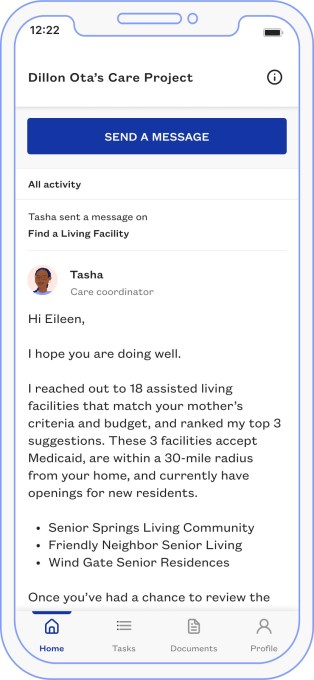It’s called the sandwich generation for a reason.
Millions of people in the U.S. are taking care of parents as they age or deal with illnesses. The constant demands of caregiving, often while working and raising children at the same time, can take a huge toll.
It’s not uncommon for caregivers to feel overwhelmed as they navigate the administrative and logistical complexities of caring for a parent. Wellthy is a startup aimed at helping caregivers be more equipped to deal with all aspects of their various responsibilities by serving as a self-described “tech-enabled care concierge.” Its founder, Lindsay Jurist-Rosner, knows firsthand how challenging caregiving can be. She spent 28 years as the primary caregiver for her mother, who had multiple sclerosis. During that time, she also held a full-time job as a marketing manager at Microsoft.

Image Credits: Wellthy
Jurist-Rosner founded Wellthy in 2015 (the startup actually launched as a Battlefield contestant at TechCrunch Disrupt that year) to help others like herself who were juggling work and caregiving. At first, the company offered its services direct to consumer but by 2017, it had started working with employers so businesses could cover the cost of Wellthy as an employee benefit. Companies like Salesforce and Snap signed up immediately.
Wellthy works by hiring “skilled” individuals, many of whom are social workers, and matches them up with families to help them with things like making follow-up doctor appointments, providing transportation to those appointments and acquiring needed equipment and supplies.
“The goal is to make their lives better and easier, but also to help save money,” Jurist-Rosner said. “Care is so massively expensive and opaque — and access is an issue.”
Employers have an interest in helping their employees with caregiving, considering one of the reasons people leave the workforce is because of struggling with caring for loved ones.
“It’s not an uncommon issue and yet it’s so under-discussed,” Jurist-Rosner said. “It feels like mental health and women’s health have started to get some well-deserved attention but caregiving is still really under the radar.”
Wellthy saw its business “explode” in 2020 after the COVID-19 pandemic hit as care became even more challenging “and employers were figuring out how they could best support employees,” said Jurist-Rosner. From 2019 to 2022 the number of lives covered with Wellthy benefits grew from about 100,000 to 2 million. And while the company declined to reveal hard revenue figures, Jurist-Rosner says it saw 17x growth in revenue from 2019 to 2022.
Today, Wellthy works with health plans and hundreds of companies, including 30 of the Fortune 500 employers, six of the top 10, and businesses such as Best Buy, Cisco and Hilton. To support its continued growth, Wellthy just raised $25.5 million in funding. In an effort to expand its offerings, the startup has acquired Lantern, a public benefit corporation founded in 2018 that provides guidance for individuals and families on navigating life before and after a death.
Wellthy still does have a private pay business but doesn’t promote it. It mainly exists so that if an employee leaves a company that paid for access to Wellthy’s services, they can still get help.
In total since inception, Wellthy has raised just over $77 million. Its latest financing was an up round, but Jurist-Rosner said that was not something the company was focused on.

Founder and CEO Lindsay Jurist-Rosner with her parents. Image Credits: Wellthy
“This was an opportunistic raise for us,” she said. “We have a lot to do on the tech side to support our growth, and we’re launching with some health insurance companies. So, there’s just a lot of momentum that we wanted to be able to continue to support with some real investment.”
Previous backers Hearst and Eldridge co-led the financing (both are also Wellthy clients), which included participation from new backers Citi Impact Fund, Cercano Management (Paul Allen’s family fund) and Stardust Equity, and existing backers such as ReThink Impact.
Presently, New York City-based Wellthy has about 350 employers, 90% of which are full-time.
Todd Boehly, chairman and CEO of Eldridge, believes Wellthy has helped to both define and drive innovation in the caregiving market.
Ryan Alam, senior vice president of the Citi Impact Fund, notes that one in five adults in America is a caregiver.
“That’s a big number that will only grow over the next few decades,” he added. “Anyone who has been a caregiver for a loved one will likely tell you it’s one of the toughest jobs they’ve ever had. In fact, people are dropping out of the workforce at alarming rates because they struggle with the challenges of caregiving at home. Wellthy is the market leader in solving that and it’s a privilege to support their mission.”
Wellthy lands $25M to help caregivers feel less overwhelmed by Mary Ann Azevedo originally published on TechCrunch















 English (US) ·
English (US) ·